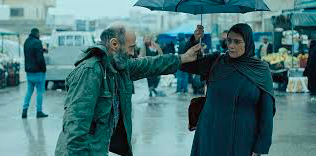Gaza Mon Amour Review: Love Doesn’t Need to Look Pretty
By: María Teresa Fidalgo-Azize | Arab America Contributing Writer
The story is about love because there is this preconceived idea that this place in Gaza, it’s only full of destruction and vandalization and occupation. And in the midst of it all this, there is really something that we should discuss. It is love.
Tarzan and Arab Nasser, Gaza Mon Amour Q&A| 2020
Evading the grimness of a fatalistic ending or the filtered lies of untroubled happiness, Palestinian Academy Award 2021 entry Gaza Mon Amour speaks on how love can realistically subsist even when residing within a scarred yet treasured homeland. Gaza Mon Amour, directed by Tarzan and Arab Nasser, follows the life of a lonely old fisherman, Issa (Salim Daw), who falls in love with a widow, Siham (Hiam Abbas), a market seamstress living with her divorced daughter. Both protagonists are subjected to the war-zone circumstances of living in the Gaza settlements. Crippling poverty, authoritarian rule, political extremism, and doctrinal, cultural conservatism define the conditions of this unlikely love story which dually engages with the heartbreak for one’s homeland and momentary glimpses of a simple life. Blinded by social media’s unattainable parameters of perfection and newsreels of endless Third World tragedy, Gaza Mon Amour discards creating a romantic story built either by sensationalist trauma or fragranced escapism for something more truthful and undefined: love’s inspiration to survive.
Gaza Mom Amour: Can We Ever Leave?
Issa: Why not invest here, instead of throwing your money in the sea?
Samir: No way. If I could, I would even pay more not to stay in this country for another minute.
Issa: And your wife and kids?
Samir: Once I settle, I’ll bring them over. Family reunion!
Issa: If you are not afraid to be caught, fine. But do you trust this guy to get you to Europe? So many people drown.
Samir: Why do you think they risk their lives?
Issa: I do not know what to tell you. May God protect you.
Gaza Mon Amour, Tarzan Nasser and Arab Nasser
The film’s lighting mirrors anemic paleness- the ashen color scheme reinforces how Gaza gradually takes away from its citizens the life-sustaining rays of the sun. Despite their age difference, Issa and Samir’s dynamic is of comradeship. After working himself to hopelessness, Samir, a convenience store cashier, decides to risk losing Gaza as a home to pursue a better life in Europe. Issa and Samir’s conversation, as seen in the quote above, embodies the countless conservations immigrants, refugees, and citizens from war-torn countries that face life-threatening conditions have —is freedom worth the risk of death, or is staying worth embracing despair? Issa decisively refuses to leave Gaza, notwithstanding its inhospitable conditions. Tarzan and Arab Nasser’s portrayal of the ideological juxtaposition between these characters allows for an empathetic understanding of who leaves and who stays- neither decision is taken lightly or judged.
Inspired by the 2014 story of a fisherman in Gaza who found a Greek statue of Apollo, which was confiscated by Hamas, Gaza Mon Amour includes this storyline to spotlight the normalization of citizens’ barely existent rights to ownership. Hostage to both Israeli military law and Hamas’ rule, Issa’s sustenance for emotional livelihood lies in his love for Siham. Gaza functions under economic ruin, leaving no worker exempt from impending destitution. The symbolic function of Apollo’s statue and Issa’s incessant yearning to own it verges into the absurd. Nevertheless, Issa’s insistence — which costs temporary imprisonment—demonstrates how the citizens of Gaza’s impoverished conditions leave them yearning to have something exclusively their own, even if it is useless. One can expect desperation from those born in a barren country.
Conclusion

The film concludes in a satiric comedy of sorts: Issa and Siham are together and in love sailing on a boat detained by Israeli forces after crossing the limited 3 miles of sea assigned to Gaza. Gaza Mon Amour’s direction does not misguide its audience into the delusion of a resolved life for these protagonists—even amid their nation’s ongoing pain, something beautiful can emerge from their union.
Works Cited:
Abele, Robert. “Review: ‘Gaza Mon Amour’ Reminds Us That Love Can Emerge in the Unlikeliest of Places.” Los Angeles Times, Los Angeles Times, 4 Nov. 2021, www.latimes.com/entertainment-arts/movies/story/2021-11-04/review-gaza-mon-amour.
Adhan , Salma. “‘Gaza Mon Amour’: A Different Look at Contemporary Gaza.” Al Majalla, 13 Aug. 2021, en.majalla.com/node/153751/artgaza-mon-amour-different-look-contemporary-gaza.
Halbfinger, David M, and Adam Rasgon. “Life under Occupation: The Misery at the Heart of the Conflict.” The New York Times, The New York Times, 22 May 2021, www.nytimes.com/2021/05/22/world/middleeast/israel-gaza-conflict.html.
Nasser, Tasser and Arab Nasser, directors. Gaza Mon Amour . Les Films Du Tambou, 2020.
Check out Arab America blog here !








